Livius may refer to:
- Marcus Livius Drusus Claudianus, a Roman senator opposing the autocracy of Augustus
- Livius , a genus of spiders described in the 1960s
- Livy, Latin name Titus Livius, a Roman historian
- Livius.org, a website on ancient history
Livius may refer to:
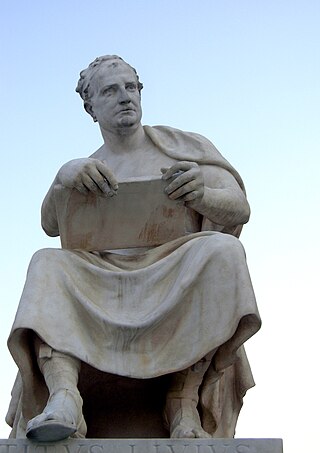
Titus Livius, known in English as Livy, was a Roman historian. He wrote a monumental history of Rome and the Roman people, titled Ab Urbe Condita, ''From the Founding of the City'', covering the period from the earliest legends of Rome before the traditional founding in 753 BC through the reign of Augustus in Livy's own lifetime. He was on good terms with members of the Julio-Claudian dynasty and was a friend of Augustus, whose young grandnephew, the future emperor Claudius, he encouraged to take up the writing of history.
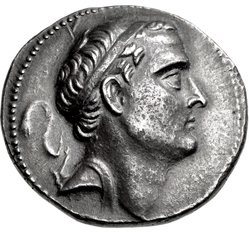
Seleucus IV Philopator, ruler of the Hellenistic Seleucid Empire, reigned from 187 BC to 175 BC over a realm consisting of Syria, Mesopotamia, Babylonia and Nearer Iran.

Carnuntum was a Roman legionary fortress and headquarters of the Pannonian fleet from 50 AD. After the 1st century, it was capital of the Pannonia Superior province. It also became a large city of approximately 50,000 inhabitants.

Lucius Livius Andronicus was a Greco-Roman dramatist and epic poet of the Old Latin period during the Roman Republic. He began as an educator in the service of a noble family, producing Latin translations of Greek works, including Homer's Odyssey. The translations were meant, at first, as educational devices for the school which he founded. He also wrote works for the stage—both tragedies and comedies—which are regarded as the first dramatic works written in the Latin language. His comedies were based on Greek New Comedy and featured characters in Greek costume. Thus, the Romans referred to this new genre by the term comoedia palliata or fabula palliata, meaning "cloaked comedy," the pallium being a Greek-style cloak. The Roman biographer Suetonius later coined the term "half-Greek" of Livius and Ennius. The genre was imitated by later generations of playwrights, and Andronicus is accordingly regarded as the father of Roman drama and of Latin literature in general; that is, he was the first man of letters to write in Latin. Varro, Cicero, and Horace, all men of letters during the subsequent Classical Latin period, considered Livius Andronicus to have been the originator of Latin literature. He is the earliest Roman poet whose name is known.

Legio XIV Gemina was a legion of the Imperial Roman army, levied by Julius Caesar in 57 BC. The cognomen Gemina (Twinned) was added when the legion was combined with another understrength legion after the Battle of Actium. The cognomen Martia Victrix was added following their service in the Pannonian War c. AD 9 and the defeat of Boudicca in AD 61. The emblem of the legion was the Capricorn, as with many of the legions levied by Caesar.

The Fall of the Roman Empire is a 1964 American epic historical drama film directed by Anthony Mann and produced by Samuel Bronston, with a screenplay by Ben Barzman, Basilio Franchina and Philip Yordan. The film stars Sophia Loren, Stephen Boyd, Alec Guinness, James Mason, Christopher Plummer, Mel Ferrer, and Omar Sharif.
Drusus may refer to to:
Tribune of the plebs, tribune of the people or plebeian tribune was the first office of the Roman state that was open to the plebeians, and was, throughout the history of the Republic, the most important check on the power of the Roman Senate and magistrates. These tribunes had the power to convene and preside over the Concilium Plebis ; to summon the senate; to propose legislation; and to intervene on behalf of plebeians in legal matters; but the most significant power was to veto the actions of the consuls and other magistrates, thus protecting the interests of the plebeians as a class. The tribunes of the plebs were typically found seated on special benches set up for them in the Roman Forum. The tribunes were sacrosanct, meaning that any assault on their person was punishable by death. In imperial times, the powers of the tribunate were granted to the emperor as a matter of course, and the office itself lost its independence and most of its functions.

The History of Rome, perhaps originally titled Annales, and frequently referred to as Ab Urbe Condita, is a monumental history of ancient Rome, written in Latin between 27 and 9 BC by the Roman historian Titus Livius, better known in English as "Livy". The work covers the period from the legends concerning the arrival of Aeneas and the refugees from the fall of Troy, to the city's founding in 753 BC, the expulsion of the Kings in 509 BC, and down to Livy's own time, during the reign of the emperor Augustus. The last event covered by Livy is the death of Drusus in 9 BC. 35 of 142 books, about a quarter of the work, are still extant. The surviving books deal with the events down to 293 BC, and from 219 to 166 BC.
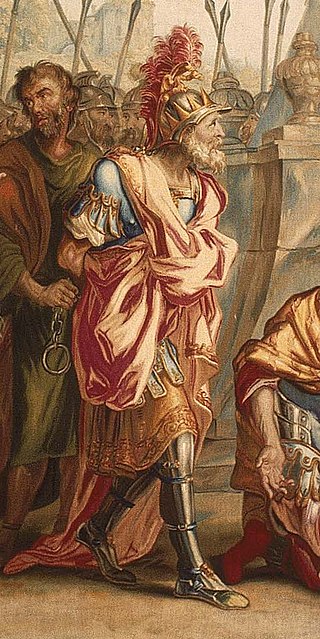
Astyages was the last king of the Median kingdom, reigning from 585 to 550 BCE. The son of Cyaxares, he was dethroned by the Persian king Cyrus the Great.

Attalus II Philadelphus was a ruler of the Attalid kingdom of Pergamon and the founder of the city of Attalia.

Gaius Claudius Nero was a Roman general active during the Second Punic War against the invading Carthaginian force, led by Hannibal Barca. During a military career that began as legate in 214 BC, he was praetor in 212 BC, propraetor in 211 BC during the siege of Capua, before being sent to Spain that same year. He became consul in 207 BC.
Livius Salinator may refer to:
Marcus Livius Drusus may refer to:

Liviu Ciulei was a Romanian theater and film director, film writer, actor, architect, educator, costume and set designer. During a career spanning over 50 years, he was described by Newsweek as "one of the boldest and most challenging figures on the international scene".
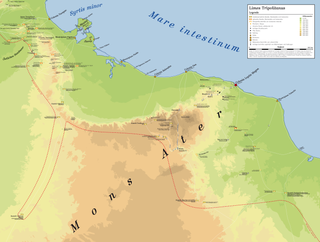
The Limes Tripolitanus was a frontier zone of defence of the Roman Empire, built in the south of what is now Tunisia and the northwest of Libya. It was primarily intended as a protection for the tripolitanian cities of Leptis Magna, Sabratha and Oea in Roman Libya.
Jona Lendering is a Dutch historian and the author of books on antiquity, Dutch history and modern management. He has an MA in history from Leiden University and an MA in Mediterranean culture from the Amsterdam Free University, taught history at the Free University, and worked as an archivist employed by the Dutch government, before becoming one of the founders of the history school Livius Onderwijs.
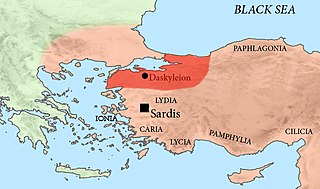
Hellespontine Phrygia or Lesser Phrygia was a Persian satrapy (province) in northwestern Anatolia, directly southeast of the Hellespont. Its capital was Dascylium, and for most of its existence it was ruled by the hereditary Persian Pharnacid dynasty. Together with Greater Phrygia, it made up the administrative provinces of the wider Phrygia region.
Gaius Livius Drusus may refer to: